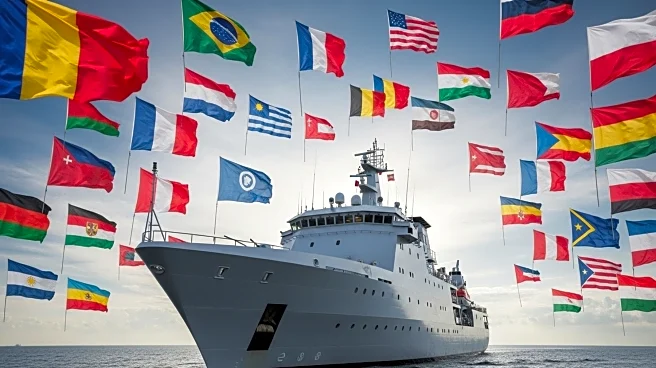What's Happening?
The International Maritime Organization (IMO) is preparing for a crucial vote on carbon levies aimed at achieving compliance with its 2050 Net Zero Framework. The Marine Environment Protection Committee (MEPC) requires a two-thirds majority from its 176 members to adopt the framework. The proposal has polarized opinions, with significant opposition from various shipping companies and countries. The United States has openly expressed its opposition to the framework and is actively lobbying other nations to reject it. The framework is supported by the Getting to Zero Coalition, which includes 180 shipping companies that have modernized their fleets to meet emission targets. However, some shipping lines, including TMS, Capital Maritime & Trading, and others, warn of excessive financial burdens if the framework is adopted.
Why It's Important?
The outcome of the IMO vote on carbon levies is significant for the global shipping industry, which faces potential financial impacts depending on the decision. If adopted, the framework could impose levies on vessels failing to meet emission standards, affecting shipping costs and consumer prices. The U.S. opposition highlights the geopolitical dimensions of environmental policy, as it seeks to influence international maritime regulations. The decision could set a precedent for future environmental policies and impact international trade dynamics, with potential benefits for companies that have invested in cleaner technologies.
What's Next?
If consensus is not reached before the MEPC meeting, the vote may be postponed, and the framework modified to gain necessary support. The U.S. will likely continue its lobbying efforts, potentially swaying other nations to oppose the framework. Shipping companies and national representatives will need to navigate the divided opinions and consider the economic implications of the decision. The ongoing debate underscores the challenges in balancing environmental goals with economic interests in international policy-making.
Beyond the Headlines
The IMO's decision on carbon levies could have long-term implications for environmental standards in the shipping industry. It raises ethical questions about the responsibility of nations and companies in addressing climate change. The framework's adoption could accelerate technological advancements in cleaner shipping methods, influencing future industry practices. The debate also reflects broader tensions between economic growth and environmental sustainability, highlighting the complexities of global governance in addressing climate issues.









